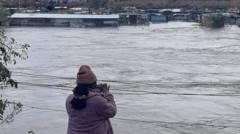In an escalation of regional tensions, the Israeli military has targeted the strategically significant port city of Hudaydah, a pivotal site for humanitarian aid as well as military operations by the Iran-backed Houthi group.
Israeli Navy Targets Houthi-Controlled Hudaydah in Response to Attacks

Israeli Navy Targets Houthi-Controlled Hudaydah in Response to Attacks
Recent Israeli naval strikes on Yemen's port city of Hudaydah, controlled by the Houthi movement, aim to mitigate missile threats against Israel.
Israeli naval vessels executed strikes early Tuesday, justifying their actions as a direct response to missile attacks that the Houthis have launched towards Israel, purportedly in solidarity with Palestinians amidst ongoing conflict in Gaza.
The Israeli Defense Forces (IDF) asserted that these attacks were necessary to disrupt the Houthis' logistical capacities, emphasizing concerns over the port being used for military ends rather than humanitarian purposes. Reports from the scene indicated plumes of smoke rising from the port following the strikes, which are described as a departure from Israel's conventional airstrikes, revealing a possible shift in military strategy.
Houthi officials downplayed the impact of these strikes, claiming they would not affect the group's morale or operational capabilities. The Houthis have previously demonstrated their willingness to engage in missile attacks targeting Israel, particularly amid the escalation of violence relating to the Palestinian situation.
Historically, Hudaydah port has been essential for the delivery of food and humanitarian supplies to millions affected by Yemen's civil war, which has devastated the nation since the Houthi movement seized control in 2014. The ongoing conflict has seen the Houthis increasingly resort to maritime aggression in the Red Sea, targeting commercial vessels and complicating global shipping routes.
This new wave of hostilities also fits into a broader backdrop of military engagement involving various global powers in Yemen, with implications for international trade and regional stability. As tensions rise, responses from global leaders and neighboring nations may shape the future trajectory of this conflict-ridden region.
In this dynamic environment, focus remains on the humanitarian crisis in Yemen, while the geopolitical implications of military actions involve significant repercussions for global maritime safety and regional security.
The Israeli Defense Forces (IDF) asserted that these attacks were necessary to disrupt the Houthis' logistical capacities, emphasizing concerns over the port being used for military ends rather than humanitarian purposes. Reports from the scene indicated plumes of smoke rising from the port following the strikes, which are described as a departure from Israel's conventional airstrikes, revealing a possible shift in military strategy.
Houthi officials downplayed the impact of these strikes, claiming they would not affect the group's morale or operational capabilities. The Houthis have previously demonstrated their willingness to engage in missile attacks targeting Israel, particularly amid the escalation of violence relating to the Palestinian situation.
Historically, Hudaydah port has been essential for the delivery of food and humanitarian supplies to millions affected by Yemen's civil war, which has devastated the nation since the Houthi movement seized control in 2014. The ongoing conflict has seen the Houthis increasingly resort to maritime aggression in the Red Sea, targeting commercial vessels and complicating global shipping routes.
This new wave of hostilities also fits into a broader backdrop of military engagement involving various global powers in Yemen, with implications for international trade and regional stability. As tensions rise, responses from global leaders and neighboring nations may shape the future trajectory of this conflict-ridden region.
In this dynamic environment, focus remains on the humanitarian crisis in Yemen, while the geopolitical implications of military actions involve significant repercussions for global maritime safety and regional security.






















